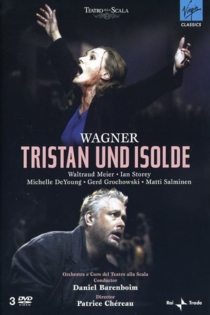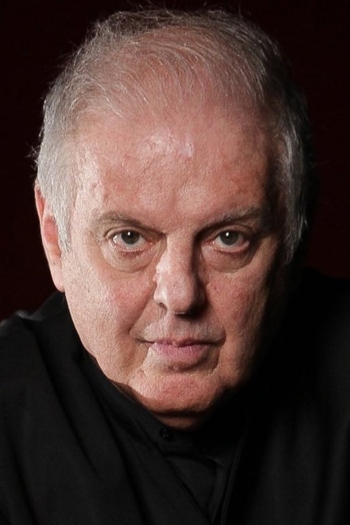
Daniel Barenboim
1942 (83 года)He is the general music director of the Berlin State Opera, and the Staatskapelle Berlin; he previously served as Music Director of the Chicago Symphony Orchestra, the Orchestre de Paris and La Scala in Milan. Barenboim is known for his work with the West–Eastern Divan Orchestra, a Seville-based orchestra of young Arab and Israeli musicians, and as a resolute critic of the Israeli occupation of Palestinian territories. He has won seven Grammy awards for his work and discography. Barenboim is a polyglot, fluent in Spanish, Hebrew, English, French, Italian, and German.
The music conductor is a citizenship of Argentina, Israel, Palestine, and Spain. Barenboim currently lives in Berlin.
Wagner: Die Walküre
Guy Cassiers
Simon O’Neill, John Tomlinson
Richard Wagner called Die Walküre the “first evening” of the Ring of the Nibelung; he called Das Rheingold the prologue or Vorabend. Musically and dramatically, we are introduced to a radically new and different world when the opening bars of Die Walküre resound. A fully developed orchestral palette of Leitmotivs paints a wild storm scene, and the curtain rises on a modest dwelling: a fully human scene that has nothing to do with the gods, dwarves and nymphs of Das Rheingold. At the same time, however, the way Die Walküre portrays radical beginnings reveals some telling reminiscences of the unfolding of Das Rheingold. Die Walküre is exciting and deeply feeling drama.
Wagner: Die Walküre
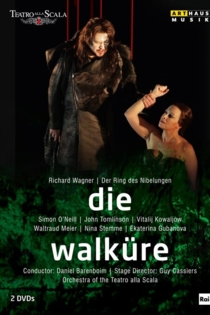
Der Ring des Nibelungen: Das Rheingold
Harry Kupfer
Daniel Barenboim, John Tomlinson
PRELIMINARY EVENINING OF THE RING CYCLE. Upon the banks of the ageless river Rhine, the Rhinemaidens play. Alberich, a Nibelung dwarf, tries vainly to seduce one of them. To taunt him, they reveal their secret: out of the gold they guard one can forge a Ring to rule the world, but at the cost of giving up Love forever. Alberich steals the gold, makes the ring and plans his world take-over. Meanwhile, Wotan, King of the Gods, must figure out how to finance the construction of Valhalla. He has promised his sister-in-law as payment to the giant construction workers led by Fafner, but his wife Fricka disapproves. Loge (God of Fire) tricks Alberich and brings him to Wotan, who takes the Ring. In revenge Alberich curses it: lack of the Ring will fuel desire for it and possession will only lead to misery. Wotan gives the Ring to Fafner as ransom for Fricka's sister. Filmed at the Bayreuth Festspielhaus in June & July 1991.
The Ring Cycle: Das Rheingold
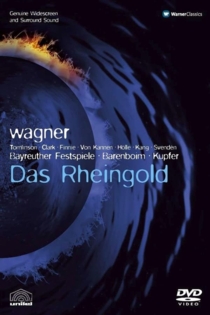
Der Ring des Nibelungen: Die Walküre
Harry Kupfer
Daniel Barenboim, Poul Elming
FIRST DAY OF THE RING CYCLE. Fleeing for his life, Siegmund seeks shelter at Sieglinde's house. Her husband Hunding happens to be one of Siegmund's pursuers, and the two of them must cross swords the next day. As Siegmund laments his lack of a weapon, Sieglinde directs him to the sword Nothung stuck in an ash tree. Despite discovering they are twin siblings, the two fall in love. The King of Gods Wotan, their father, sends his Valkyrie daughter Brünnhilde to aid Siegmund. Fricka protests, and Wotan uses his spear to break Siegmund's sword during the battle. Siegmund is slain, but Brünnhilde rescues both the sword fragments and Sieglinde who is pregnant with Siegmund's child Siegfried. Wotan is angry that she intervened, but since Brünnhilde is his favorite child, he merely strips her of immortality and sends her into an enchanted sleep, surrounded by fire. Filmed at the Bayreuth Festspielhaus in June & July 1992.
The Ring Cycle: Die Walkure
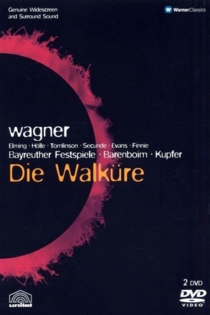
Claudio Abbado: Die Stille nach der Musik
Paul Smaczny
Claudio Abbado, Pierre Boulez
Shot over a two-year period observing Abbado: a) Rossini, Overture to 'll Barbiere di Siviglia' b) Schubert, Symphony no. 2 B-Major, D. 125 c) Arnold Schonberg, Kammersinfonie no. 1 E-Major op. 9 (Filmed in Venice, Gran Teatro La Fenice, in February 1995, Chamber Orchestra of Europe). a) Richard Strauss, Elektra (Deborah Polaski, Karita Mattila, Marjana Lipovsek, Ferrucio Furlanetto) b) Beethoven, Symphony no 6 F-Major, op. 68, 'Pastorale' (Filmed in the Festspielhaus Salzburg on the occasion of the Easter Festival, April 1995, Berlin Philharmonic). a) Beethoven, Concerto for piano and orchestra no. 3 C-MINOR, OP. 37 (Maria Joao Pires) b) Bruckner, Symphony no. 9 D-Minor (Filmed in Paris, Cite de la Musique, in August 1995, Gustav Mahler Youth Orchestra).
Abbado: The Silence that Follows the Music
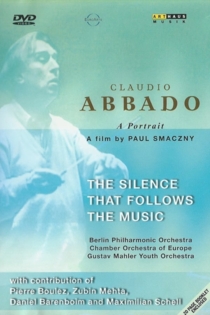
Patrice Chéreau, Pascal Greggory, une autre solitude
Stéphane Metge
Patrice Chéreau, Pascal Greggory
A look at the entire process of creating and developing Patrice Chéreau’s third staging of "In the Solitude of Cotton Fields" by Bernard Marie Koltès with Pascal Greggory and Chéreau himself. From the first reading around the table through the first contact with the performance space, rehearsals and lighting to opening night, the entire creative process unfurls in front of our eyes. The film shows us the evolving and ongoing dialogue between Greggory and Chéreau, a dialogue full of crises and magical moments of harmony and insight via which the truth, intensity, complexity, mystery and depth of Koltès’ text gradually emerge to form an implicit bond between these two men. The film also shows Chéreau directing rehearsals for Mozart’s "Don Giovanni" in Salzburg, revealing both the unity of and profound differences between his opera and theater work.
Patrice Chéreau, Pascal Greggory, une autre solitude

Der Ring des Nibelungen: Siegfried
Horant H. Hohlfeld
John Tomlinson, Siegfried Jerusalem
SECOND DAY OF THE RING CYCLE. Alberich's brother Mime raises the orphan Siegfried, hoping that Siegfried will kill Fafner and enable Mime to gain the ring. Mime attempts unsuccessfully to reforge the Nothung. Fulfilling prophecy, Siegfried reforges the sword himself and kills Fafner, who has the form of a dragon. When he accidentally tastes the dragon's blood spilt on his hands, Siegfried understands the song of a woodbird, who instructs him to take the Ring from Fafner. Reading Mime's thoughts of betrayal, Siegfried kills the dwarf as well. The woodbird also informs Siegfried of a mysterious woman asleep in the midst of fire, and Siegfried sets off to find her. After defeating a disguised Wotan and breaking his spear, Siegfried successfully awakes Brünnhilde, and the two fall in love. Filmed at the Bayreuth Festspielhaus in June & July 1992.
The Ring Cycle: Siegfried
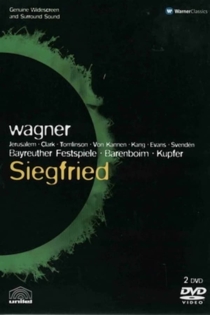
Der Ring des Nibelungen: Götterdämmerung
Harry Kupfer
Daniel Barenboim, Siegfried Jerusalem
THIRD DAY OF THE RING CYCLE. Günter, the lord of the Rhine people, gives Siegfried a love potion that causes Siegfried to forget Brünnhilde and fall in love with Günter's sister Gutrane. Siegfried has given Brünnhilde the Ring as a token of their love, but her Valkyrie sister urges her to destroy it, because their father Wotan has lost his spear and power and is hiding out in Valhalla. Instead, Brünnhilde keeps it, and under the influence of the potion, Siegfried steals it from her. Enraged, Brünnhilde helps Alberich's son murder Siegfried, but Siegfried's memory returns, and he dies thinking of Brünnhilde. Brünnhilde repents and orders a funeral pyre to be built. She rides into the fire herself, and the Rhinemaidens get the ring back. The story closes with flames flickering about Valhalla in the background. Filmed at the Bayreuth Festspielhaus in June & July 1991.
The Ring Cycle: Gotterdammerung
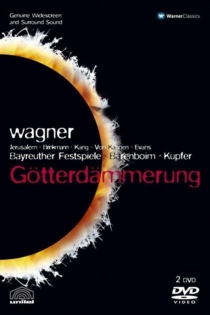
The Art of Piano - Great Pianists of 20th Century
Donald Sturrock
Vladimir Horowitz, Arthur Rubinstein
This is a film that encapsulates the essence of a great pianistic age that married virtuosity and musicianship with the most thrilling aspect of individual showmanship.
The Art of Piano - Great Pianists of 20th Century
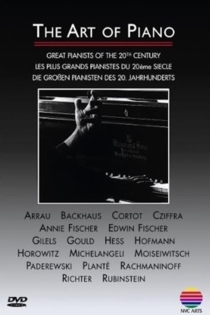
Dudamel: El sonido de los ninos
Alberto Arvelo
José Antonio Abreu, Daniel Barenboim
Hundreds of children and youth orchestras around the world are emerging musical inspired by the Venezuelan phenomenon known as "The System." This rebellion of thousands of children are being held internationally to give children everywhere the opportunity to grow in an atmosphere of creativity, companionship, entertainment, art, discipline and high social values. The brilliant and charismatic Venezuelan conductor Gustavo Dudamel leads to an unforgettable journey to some of the most remote corners of the world, about the transformative stories of a group of children who bring us a clear and powerful message: "music is a universal right. " Filmed in seven countries, Dudamel: the sound of children is a journey into the bowels of this global phenomenon that elevates the importance of art as a spiritual weapon against a dehumanized world.
Dudamel: El sonido de los ninos

Eugene Onegin
Brian Large
Daniel Barenboim, Peter Mattei
The Wiener Philharmoniker mounts, and Andrea Breth stages, this 2007 production of Pyotr Illych Tchaikovsky's opera Eugene Onegin, starring Peter Mattei, Joseph Kaiser, Anna Samuil and Renée Morloc. The Konzertvereinigung Wiener Staatsopernchor lends added musical accompaniment, under the baton of Daniel Barenboim.
Eugene Onegin
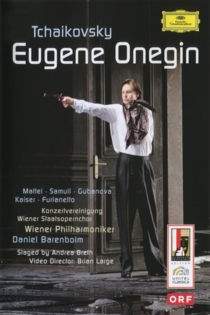
Wagner: Götterdämmerung
Guy Cassiers
Lance Ryan, Iréne Theorin
Götterdämmerung, the final instalment of Wagner’s Ring of the Nibelung, is a story of human passions. Two essentially benevolent creatures, involved with and possibly doomed by their traffic with the gods, find treachery and evil in the world of the humans, and are ruined by the dark side of humanity. Iréne Theorin, acclaimed worldwide for her portrayal of Wagner’s heroines, stars as Brünnhilde opposite Lance Ryan, who continues his radiant portrayal of the tragic hero Siegfried. The strong cast also includes Mikhail Petrenko as the dark antagonist Hagen and Johannes Martin Kränzle, who once again shines as his father Alberich. Waltraud Meier has a memorable appearance as Brünnhilde’s sister Waltraute. With this 2013 recording of Götterdämmerung, the musically and visually compelling Scala Ring Cycle by Daniel Barenboim and Guy Cassiers was completed and proved to be one of the highlights of the Richard Wagner bicentenary.
Wagner: Götterdämmerung
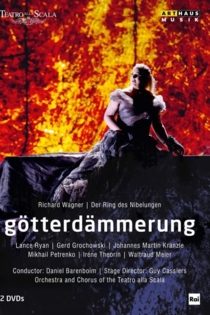
Manon
Vincent Paterson, Andreas Morell
Daniel Barenboim, Anna Netrebko
Massenet's opera centres on its charming but contrary heroine, the vivacious young Manon who longs for luxury and excitement. We first encounter her en route to a convent, where her family are sending her to be educated. Along the way, she falls in love with the young student Des Grieux, and, impetuously, runs off with him. She soon leaves him, however, to become the mistress of a rich nobleman. Thus begins her descent into criminality and depravity, all too soon dragging the besotted Des Grieux with her, until she is imprisoned. Despite its tragic story, the opera is full of French charm and vitality – typified by the ambiguous Manon herself. Her plight is touching because of the subtle play of innocence and calculation in her character. The score contains many sparkling arias and ensembles, moving rapidly from moods of exuberance to tenderness, with perfect dramatic timing. Recorded live at the Staatsoper Unter den Linden, Berlin, April/May 2007.
Massenet: Manon
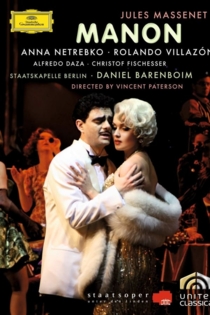
Beethoven - Choral Fantasy and Triple Concerto for Violin, Cello & Piano
Barrie Gavin
Daniel Barenboim, Itzhak Perlman
The music is not Beethoven's most familiar, but it is absolutely charming. The concerto is appealing in its melodic material and the intricate interactions among the soloists and orchestra. The Choral Fantasy features a long piano solo that Beethoven wrote for himself, plus a choral melody that sounds like a preliminary sketch for the last movement of his Ninth Symphony. Both works pose unusual balance challenges, to which Barenboim and the recording engineers rise impressively.
Beethoven - Choral Fantasy and Triple Concerto for Violin, Cello & Piano

Wagner: Siegfried
Guy Cassiers
Lance Ryan, Peter Bronder
In Siegfried, the “Second Day” or third evening of the Ring Cycle, we meet the pivotal hero of the epic tale. The energetic drive from Die Walküre is pursued here while Siegfried finally recaptures the mighty ring from Fafner the Dragon and awakens Brünnhilde from her penal sleep on the great rock. Lance Ryan, having interpreted this role on the greatest stages of the world including the Bayreuth Festival, portrays the naïve hero. His antagonists are Peter Bronder, great and agile as Mime, Terje Stensvold, an experienced Wanderer and Johannes Martin Kränzle, who continues his mean and deceitful depiction of Alberich. The leading ladies are Nina Stemme, once again unrivalled as Brünnhilde and Anna Larsson, moving as the God-mother Erda.
Wagner: Siegfried

A Labyrinth of Time
Frank Scheffer
Elliott Carter, Daniel Barenboim
Carefully composed portrait of prominent modern composer Elliott Carter (1908-1912). Scheffer depicts both the person and the development in his music and the musical tradition it grew out of, as well as the time in which the American Carter grew up. The result: historical images of the city of New York, old film footage, cinematographic finds to illustrate the music and statements by conspicuous fellow-composers and musicians, including Pierre Boulez and Daniel Barenboim.
A Labyrinth of Time
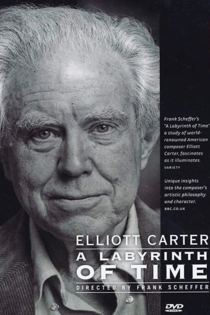
Tristan und Isolde
Patrizia Carmine
Daniel Barenboim, Ian Storey
The legendary Patrice Chéreau (Bayreuth Jahrhundertring, Queen Margot, Intimacy) directed this production of Richard Wagner's psychological music drama Tristan und Isolde at the Teatro alla Scala in 2007. It stars Ian Storey, Waltraud Meier, Matti Salminen, Gerd Grochowski and Michelle DeYoung; the Orchestra and Chorus of the Teatro Alla Scala provide musical support, under the baton of Daniel Barenboim.
Tristan und Isolde
